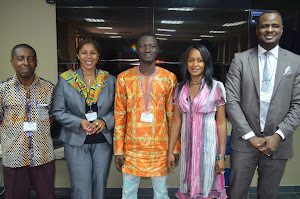BY EDMUND SMITH-ASANTE
The Economic Commission for Africa
(ECA), World Bank and African Union Commission, have joined forces to look for ways
of strengthening regional capacities to improve the continent’s readiness for
climate risks and enhance the resilience of its development to impacts of
climate change as a whole.
The three started off with a three-day
workshop in Addis Ababa, Ethiopia, Wednesday, May 23, 2012 with two components,
namely; Climate Vulnerability of Africa’s Infrastructure: A Strategic Regional
Approach; and Africa Climate Risk Management and Green Growth.
Organised by the World Bank in collaboration with the African Union
Commission and ECA’s African Climate Policy Centre, the workshop has brought
together some 60 participants representing Regional Economic Communities, River
Basin organisations, Power Pools and a broad range of stakeholders.
Addressing the opening session yesterday morning, Mr. Josué Dioné,
Director of the Food Security and Sustainable Development Division at ECA,
called on participants to ensure that the two components of the workshop are
strengthened with specific details and that an effective partnership is
established for following up on the outcomes of the encounter.
Also speaking at the opening session, Mr. Cheikh Dakate, energy expert
at the African Union Commission welcomed the workshop as a right step in the
direction charted by the Commission to help Member States better prepare
against the impacts of climate change.
At the opening session, one of two experts from the World Bank leading
the technical discussions of the workshop, Mr. Nagaraja Rao Harshadeep, Senior
Environmental Specialist, Africa Region, presented the workshop overview,
including the objectives, structure and agenda.
The other, Raffaello Cervigni, Lead Environmental Economist Regional
Coordinator, Climate Change Sustainable Development Sector, Department of
Environment and Natural Resources for Africa Region and Peter Droogers,
consultant at FutureWater, made an introduction to a study on Infrastructure
and Climate Change, entitled: Addressing the Climate Vulnerability of
Africa’s Infrastructure: A Strategic Regional Approach.
According
to an ECA
Press Release Numbered 76/2012, announcing the workshop, the analysis builds on the data platform already
established under the Africa Infrastructure Country Diagnostic (AICD), but with
significant enhancements to assess climate risks and infrastructure investment
viability with respect to future uncertainty in climate outcomes in Africa.
It states further, that the study on infrastructure and climate change
builds on the Africa Infrastructure Country Diagnostic (AICD, 2010), which was
developed by a partnership including AUC, NEPAD, RECs, AfDB, DFID, PPIAF, AFD,
EC, KFW and the World Bank.
The press release issued by the ECA Information and Communication
Service, said the study resulted in a comprehensive analysis of the continent’s
infrastructure development agenda, including estimates of the financing
required to achieve relevant Millennium Development Goals (MDGs) and other
standards of service.
To the ECA, the proposed study on climate change would add an explicit
climate dimension to AICD, so that it could become possible to quantify the
impacts of climate change on the level and composition of spending needs for
network infrastructure in the water, power pool, and transport sectors in
Africa, and also help to identify approaches to evaluating specific
infrastructure investments in the face of climate uncertainty.
The Economic Commission announced that in addition to the study, a
proposed Climate Change Risk Management and Green Growth Project (CCRM/GG) is
expected to improve the readiness of regional and national entities in Africa
to effectively manage climate risks.
Partners, it says, are hopeful that the project would provide an
integrative vehicle for capacity-building and investment readiness to enable
African nations and regional entities to effectively utilise evolving climate
financing for climate resilience and low-carbon growth, to provide both climate
and development benefits.
Meanwhile, a good number of regional agencies working on climate-related
fields, regional training institutions, the Government of Japan, the Global
Fund for Disaster Reduction and Recovery (GFDRR), and other Development
Partners are supporting the workshop.





No comments:
Post a Comment